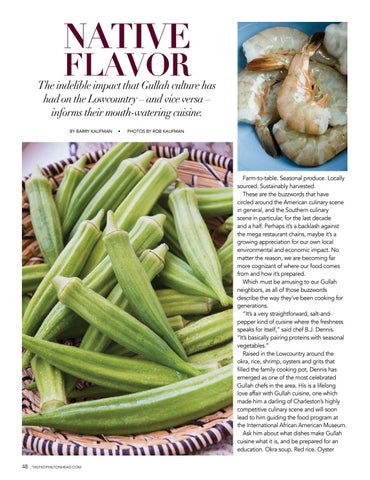NATIVE
FLAVOR
The indelible impact that Gullah culture has had on the Lowcountry – and vice versa – informs their mouth-watering cuisine. BY BARRY KAUFMAN
•
PHOTOS BY ROB KAUFMAN
Farm-to-table. Seasonal produce. Locally sourced. Sustainably harvested. These are the buzzwords that have circled around the American culinary scene in general, and the Southern culinary scene in particular, for the last decade and a half. Perhaps it’s a backlash against the mega restaurant chains, maybe it’s a growing appreciation for our own local environmental and economic impact. No matter the reason, we are becoming far more cognizant of where our food comes from and how it’s prepared. Which must be amusing to our Gullah neighbors, as all of those buzzwords describe the way they’ve been cooking for generations. “It’s a very straightforward, salt-andpepper kind of cuisine where the freshness speaks for itself,” said chef B.J. Dennis. “It’s basically pairing proteins with seasonal vegetables.” Raised in the Lowcountry around the okra, rice, shrimp, oysters and grits that filled the family cooking pot, Dennis has emerged as one of the most celebrated Gullah chefs in the area. His is a lifelong love affair with Gullah cuisine, one which made him a darling of Charleston’s highly competitive culinary scene and will soon lead to him guiding the food program at the International African American Museum. Ask him about what dishes make Gullah cuisine what it is, and be prepared for an education. Okra soup. Red rice. Oyster 48
TASTEOFHILTONHEAD.COM
